教学设计 IF引导的条件状语从句
if条件状语从句教案
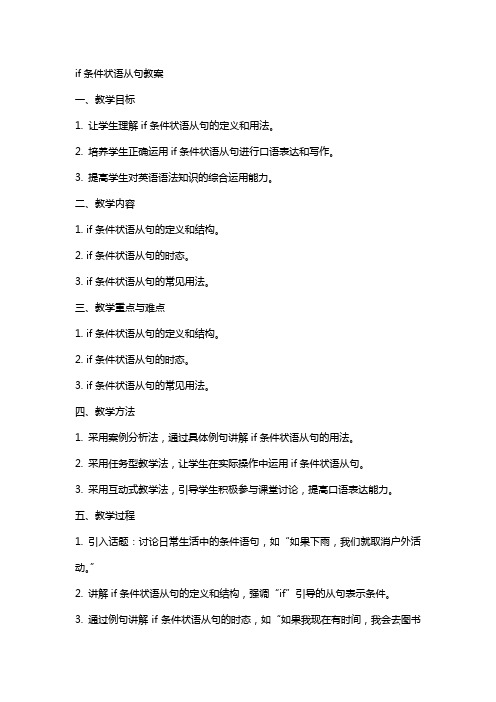
if条件状语从句教案一、教学目标1. 让学生理解if条件状语从句的定义和用法。
2. 培养学生正确运用if条件状语从句进行口语表达和写作。
3. 提高学生对英语语法知识的综合运用能力。
二、教学内容1. if条件状语从句的定义和结构。
2. if条件状语从句的时态。
3. if条件状语从句的常见用法。
三、教学重点与难点1. if条件状语从句的定义和结构。
2. if条件状语从句的时态。
3. if条件状语从句的常见用法。
四、教学方法1. 采用案例分析法,通过具体例句讲解if条件状语从句的用法。
2. 采用任务型教学法,让学生在实际操作中运用if条件状语从句。
3. 采用互动式教学法,引导学生积极参与课堂讨论,提高口语表达能力。
五、教学过程1. 引入话题:讨论日常生活中的条件语句,如“如果下雨,我们就取消户外活动。
”2. 讲解if条件状语从句的定义和结构,强调“if”引导的从句表示条件。
3. 通过例句讲解if条件状语从句的时态,如“如果我现在有时间,我会去图书馆。
”4. 分析if条件状语从句的常见用法,如表示假设、建议、条件等。
5. 进行分组练习,让学生运用if条件状语从句进行口语表达。
6. 布置课后作业:用if条件状语从句编写一段小故事。
教学反思:在教学过程中,要注意引导学生正确理解if条件状语从句的定义和用法,并通过大量例句进行讲解和练习。
要关注学生的个体差异,根据学生的实际情况进行教学调整,确保教学效果的达成。
六、教学评价1. 采用课堂观察法,评价学生在课堂上的参与度和口语表达能力。
2. 通过课后作业,评价学生对if条件状语从句的掌握程度。
3. 进行小组讨论,评价学生之间的合作能力和创新思维。
七、教学拓展1. 引导学生思考if条件状语从句在现实生活中的应用,提高学生的语言运用能力。
2. 介绍其他类型的条件状语从句,如虚拟条件状语从句等,扩大学生的语法知识范围。
3. 组织学生进行相关英语角活动,提高学生的口语交流能力。
九年级英语if引导的条件状语从句微课程设计方案

引导的条件状语从句讨论违反交通规则的后果。
在微课实施时,学生需要配合使用学习任务单(如
3.教师讲解 if 引导的条件状语从句结构。
下
图
)
。
设计意图:训练学生通过听力材料获取有关信息,并
引导学生完成泛读练习扩大学生的阅读量。利用丰富
的图片既生动形象又利于学生接受,操练了 if 引导
的条件状语从句,同时又培养学生了遵守交通规则的
培养学生学习策略的重要环节,并对本节课呈现的语
言知识进行当堂训练,逐项掌握。
Step 5 Summary & Homework
教师对本节课的内容进行小结。
1.Make more sentences by using “if”.
2. Review the key points in Section D.
预计时长 10 分钟之内
微课程设计
教学过程
设计意图
(以时间为序具体描述微课的所有环节,至少包含导课、主体内 (从教学方法、学习任务单、案例选取、内容编排呈现、互动设计、
容和小结三部分)
技术运用等方面进行说明)
Step 1 Warming up and leading in
该微课结合图片、讲解和练习的形式,将 if 引导的
《if 引导的条件状语从句》微课程设计方案
基本信息
县(市、 区)
学校
姓名
学科
初中英 语
能力维度 学情分析 教学设计 □学法指导 □学业评价
所属环境 □多媒体教学环境 混合学习环境 □智慧学习环境
微能力点 B2 微课程设计与制作
教学环境 混合学习环境
课题名称 if 引导的条件状语从句
if 引导的条件状语从句是一个看似简单,但又存在很多“陷阱”易错的知识点。在初三语法
初中英语:If引导的条件状语从句省公开课获奖课件说课比赛一等奖课件

_h_e_’_ll_p_la_y__b_a_s_k_e_tb__a.ll
Look and say
I will_e_a_t_s_o_m__e__fo_o_d__
if I’m hungry.
I will__h_a_v_e_a__r_e_s_t __
exercise.
if旳反义词:if...not...=unless,意思是:“假如不,除非”
I won’t go there unless I hear from you.(同义句 if ) don’t
I won’t go there _____ I _____hear from you. I won’t go to the party if I am not invited. (同义句)
Look and say
__I _w_i_ll_s_e__e_a__d_o_c_t_o_r_ if I’m ill.
If I’m late, _I _w_i_ll__s_a_y_s__o_r_ry____.
位置:从句可放在主句之前或之后,但是放 在主句之前须有逗号隔开
If it rains tomorrow, I_w_i_l_l _w_a_t_c_h__T_V__a_t_h__o_m__e. I won’t__p_la__y_b_a__s_k_e_t_b_a_ll_.
I won’t go to the party_u__n__less I am invited.
变换:
1.有if引导旳条件状语从句旳复合句中,当主句和从句旳 主语均为you时,可转换为“祈使句,and+简朴句”或
“祈使句,or+简朴句” You can pass the exam if you work hard. Work hard ----------------,and you will pass the exam.
条件状语从句教学设计
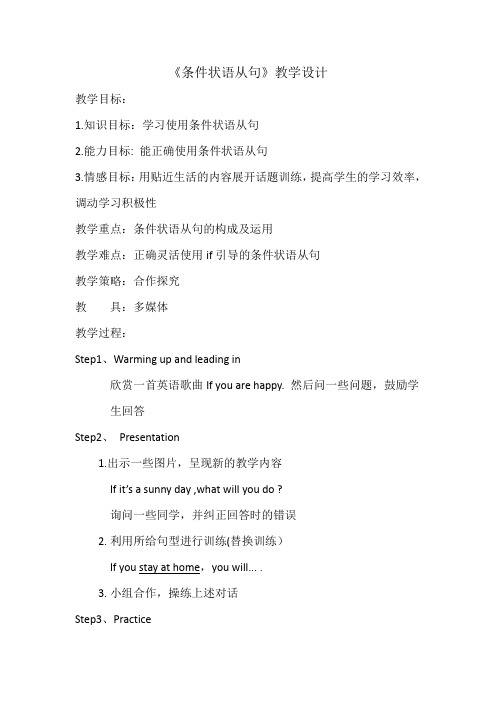
《条件状语从句》教学设计
教学目标:
1.知识目标:学习使用条件状语从句
2.能力目标: 能正确使用条件状语从句
3.情感目标:用贴近生活的内容展开话题训练,提高学生的学习效率,调动学习积极性
教学重点:条件状语从句的构成及运用
教学难点:正确灵活使用if引导的条件状语从句
教学策略:合作探究
教具:多媒体
教学过程:
Step1、Warming up and leading in
欣赏一首英语歌曲If you are happy. 然后问一些问题,鼓励学
生回答
Step2、Presentation
1.出示一些图片,呈现新的教学内容
If it’s a sunny day ,what will you do ?
询问一些同学,并纠正回答时的错误
2.利用所给句型进行训练(替换训练)
If you stay at home,you will... .
3.小组合作,操练上述对话
Step3、Practice
1、利用白板出示习题,对条件状语从句结构进行训练
2、利用题卡,训练学生灵活使用条件状语从句
3、小组合作完成话题练习,并在全班展示
Step 4、Survey
小组总结本课重点
Step 5、Homework
1、学习歌曲If you are happy
2、Writing: If you have 1 million,what will you do?。
教学设计--IF引导的条件状语从句
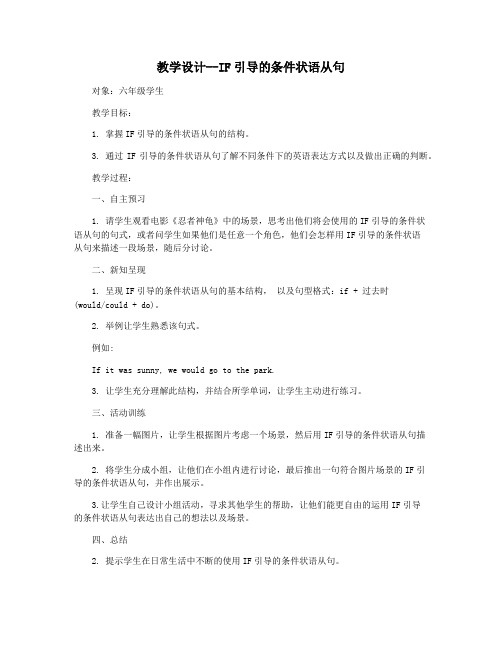
教学设计--IF引导的条件状语从句对象:六年级学生教学目标:1. 掌握IF引导的条件状语从句的结构。
3. 通过IF引导的条件状语从句了解不同条件下的英语表达方式以及做出正确的判断。
教学过程:一、自主预习1. 请学生观看电影《忍者神龟》中的场景,思考出他们将会使用的IF引导的条件状语从句的句式,或者问学生如果他们是任意一个角色,他们会怎样用IF引导的条件状语从句来描述一段场景,随后分讨论。
二、新知呈现1. 呈现IF引导的条件状语从句的基本结构,以及句型格式:if + 过去时(would/could + do)。
2. 举例让学生熟悉该句式。
例如:If it was sunny, we would go to the park.3. 让学生充分理解此结构,并结合所学单词,让学生主动进行练习。
三、活动训练1. 准备一幅图片,让学生根据图片考虑一个场景,然后用IF引导的条件状语从句描述出来。
2. 将学生分成小组,让他们在小组内进行讨论,最后推出一句符合图片场景的IF引导的条件状语从句,并作出展示。
3.让学生自己设计小组活动,寻求其他学生的帮助,让他们能更自由的运用IF引导的条件状语从句表达出自己的想法以及场景。
四、总结2. 提示学生在日常生活中不断的使用IF引导的条件状语从句。
3. 督促学生在英语学习中遇到不认识的单词,尤其是if介词引导的条件状语从句,把英语知识运用到日常生活中,进而深入学习。
五、考查评估1. 让学生回答真实情景下的IF引导的条件状语从句练习题,检查学生学习IF引导的条件状语从句使用情况,识别出学生学习错误以及正确用语的地方,分析其中的原因。
2. 向学生提出一些问题,如:如果你有5万美元,你可以做什么?结合昨天的课堂,让学生用IF引导的条件状语从句给出答案。
《if 引导的条件状语从句》教案
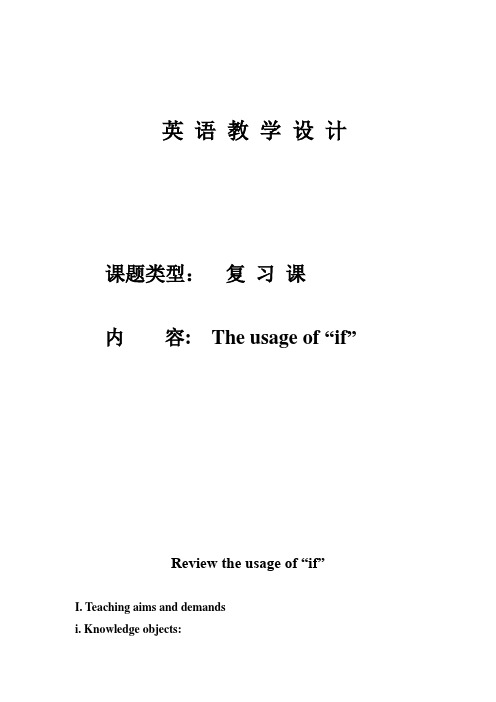
英语教学设计课题类型:复习课内容: The usage of “if”Review the usage of “if”I. Teaching aims and demandsi. Knowledge objects:1. Review the usage of “ if ”in adverbial clauses of condition2. Review the usage of “if” in subjunctive mood3. Review the usage of “if” in objective clausesii. Ability object:Train students’ speaking abilityiii. Moral object:Make students know more about helping the people in troubleII. Teaching key points1. How to tell the differences among the three situations2. How to do exercises more correctly according to what we reviewed III. Teaching difficult points1. Tell the differences between the usage of “if” i n adverbial clauses of condition and in subjunctive mood2. How to use “if” in these three different situationsIV. Teaching methods1. Sentence chains activity to help2. Competition3. Talk about the picturesV. Teaching aidssome colorful cards, The blackboard , A projectorVI. Teaching proceduresStepI.lead in and review the usage of “if” in adverbial clauses of condition.Listen to a song----“If you’re happy”. Students listen to it a nd summarize the usage of “if” in adverbial clauses of condition.eg, 1. If it rains tomorrow, I won’t go shopping.2. If he is free, he may help you.(use a song to lead in the grammar, students may be interested in it, it also activates the class atmosphere)StepII. Sentence chainDivide the class into two groups, students in each group make sentences using if adverbial clauses of condition one by one, the group can’t follow will lose the game.(Consolidate the usage of “if” in adv erbial clauses of condition) StepIII. Review the usage of “if” in subjunctive moodShow a video of the movie “Da Hua Xi You”. Then let students know the meaning of “if” here is “如果”, but it is impossible, this is the difference between “if” in adverbial clauses of condition and “if” in subjunctive mood. Then sum up the usage of “if” in this situation.eg, 1. If I had one more chance, I would say to the girl “I love you”.2. If I were you, I wouldn’t go.StepIV. Talk about the picturesShow a picture about the earthquake in Japan, then ask students “If you were a student in Japan, what would you do?”. Students talk about this topic using the usage of “if” in subjunctive mood.(Practice the speaking ability using the usage of “if” in subjunctive mood.)StepV. Review the usage of “if” in objective clausesi. S tudents think over the third usage of “if”The meaning of “if” here is “是否”, so it is simple to distinguish it.eg, 1. I don’t know i f he will pass the exam.2. I wonder if you have told the news to Li Lei.ii. S ummarize the usage of “if” in objective clauses.StepVI. ExercisesAfter revision, do some exercises on the screen.(Consolidate the teaching aims in this class)StepVII. GameShow some sentences of “if” of different usage, divide the class into groups of six, and then hand out some colorful cards; students divide the sentences into the correct usage and write the number on the colorful card. The group finishes it most quickly and correctly will win the game and will win the award.(Consolidate what we reviewed in this class.)StepVIII. SummaryIn this class, we reviewed all the usage of “if”, the usage of “if” i n adverbial clauses of condition, the usage of “if” in subjunctive mood, the usage of “if” in objective clauses.StepIX. Homework1.Remember and consolidate what we reviewed today after class bydoing more exercises.2.Preview more about adverbial clauses of condition and objectiveclauses.StepX. Blackboard design。
if 引导的条件状语从句

教学设计一If I do…, They will do…*
1.表演对话,把对话的内容写出来。 表演对话,把对话的内容写出来。 表演对话 所需语言结构: 所需语言结构:
A: I can’t get home late. What will happen if you do that? B: If I return late, mum will ask me a lot of troublesome questions. And I have to finish homework by 9:00. What about you? A: So do I. If I can’t finish it well, I can’t surf the Internet on weekends.What about your school rules? Can you wear sunglasses in class? B: Of course not. If I do, I think my teachers will let me out.
Review of units 1-5
重点: . 各单元的单词综合复习。 . 对将来的事情进行描述。 重点:1. 各单元的单词综合复习。 2. 对将来的事情进行描述。 3. 过去进行时的用法。 4. 间接引语的用法。 . 过去进行时的用法。 . 间接引语的用法。 5. 情态动词 的用法。 . 情态动词should的用法。 的用法
Unit 5 If you go to the party, you’ll have a great time.
教学理念
学会用if 学会用 引导的条件状语从句表示某件 事情的先决条件、 事情的先决条件、做出某种决定的前提和 依据、取得某种结果和成就的必备要素等。 依据、取得某种结果和成就的必备要素等。 通过学习本单元内容进一步培养学生通过 现状分析从而预知事情结果的能力; 现状分析从而预知事情结果的能力;做事 的决策能力和对社会事务的参与意识; 的决策能力和对社会事务的参与意识;社 会生活的规则意识。 会生活的规则意识。
if 引导的条件状语从句(内容设计)
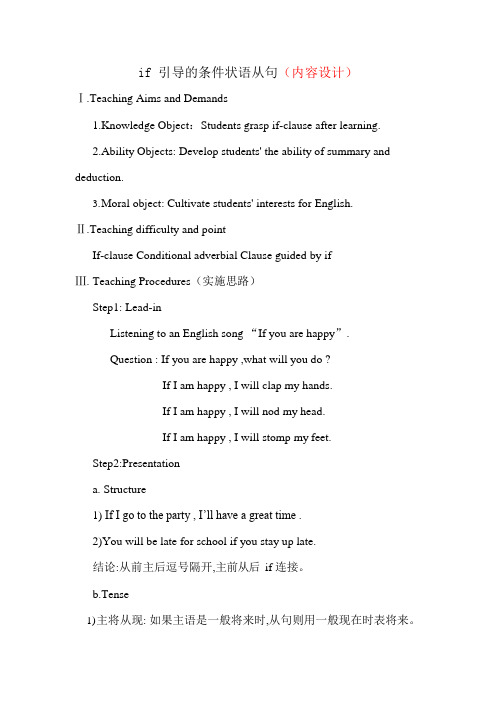
if 引导的条件状语从句(内容设计)Ⅰ.Teaching Aims and Demands1.Knowledge Object:Students grasp if-clause after learning.2.Ability Objects: Develop students' the ability of summary and deduction.3.M oral object: Cultivate students' interests for English.Ⅱ.Teaching difficulty and pointIf-clause Conditional adverbial Clause guided by ifⅢ. Teaching Procedures(实施思路)Step1: Lead-inListening to an English song “If you are happy”.Question : If you are happy ,what will you do ?If I am happy , I will clap my hands.If I am happy , I will nod my head.If I am happy , I will stomp my feet.Step2:Presentationa. Structure1)If I go to the party , I’ll have a great time .2)Y ou will be late for school if you stay up late.结论:从前主后逗号隔开,主前从后if 连接。
b.Tense1)主将从现: 如果主语是一般将来时,从句则用一般现在时表将来。
Eg : If it rains tomorrow I will stay at home.2)主情从现:主句含有must,may,can 等情态动词,从句用一般现在时表将来。
- 1、下载文档前请自行甄别文档内容的完整性,平台不提供额外的编辑、内容补充、找答案等附加服务。
- 2、"仅部分预览"的文档,不可在线预览部分如存在完整性等问题,可反馈申请退款(可完整预览的文档不适用该条件!)。
- 3、如文档侵犯您的权益,请联系客服反馈,我们会尽快为您处理(人工客服工作时间:9:00-18:30)。
教学设计IF引导的条件状语从句
一、教材、学生分析
初中英语语法,梳理总结。
二、教学目标
1 知识目标:正确运用if 引导的条件状语从句。
2 能力目标:能用if 引导的条件状语从句作出假设,用will谈论结果。
3 情感目标:围绕情景图片展开话题,提高他们学习英语的兴趣,竞争合作的小组活动培养团队学习精神。
三、教学重点和难点
重点: if引导的条件状语从句的基本结构。
难点: 条件状语从句的主、从句中的时态。
四、教学方法
口授讲解、对话互动、游戏、习题练习
五、教学过程
Step 1)导入Warming up and Leading in
1. Enjoy an English song : If you are happy
2 Ask some questions.
If you are happy, what will you do?
If I am happy, I will smile.
If you are sad, what will you do?
If I am sad, I will cry.
Step 2). 语法讲解
1、show picture 1:主将从现
If he has a lot of money, he’ll buy a big house.
2、show picture 2:主现从现(客观真理、常态事实等)
If you heat ice it turns to water. (也可用will turn)如果把冰加热,它就会化成水。
)
3、unless和if not
You will miss the train unless you hurry= You will miss the train if you don’t hurry.
4、“如果”和“是否”分清楚
Step 3)口头运用
1、看图编句,用if.
If he eats too much, he will be heavy.
2、GROUPWORK游戏if接龙
S1: I think I’m going to go to the movies tonight.
S2: If I go to the movies, I won’t finish my homework.
S3: If I d on’t finish my homework…
S4: …
Step 4)Summarize the rules
Step 5)习题练习
1.Daina ( will go/go/goes) to Europe if she (will pass/pass/passes) the exams .
2. The graduates (will teach/teach/teaches) in the poor village if the Ministry of Education (will agree/ agree/agrees) soon.
3. If there (will be/ are/is) a car accident, they (will call/call/calls) 110 for help at once.
4. If it (won’t/don’t/doesn’t/ isn’t) rainy, we (will take/ take/takes) walk outside.
5. If a UFO (will land/land/lands) in front of me, I (will go/go/goes) in to look for the alien.
六、教学评价和反思。
